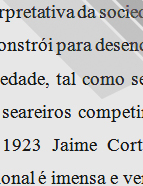

................................
Thus, a new perspective was opened for the second period, that of “Overseas Expansion.” This would be the period of great splendour in Portuguese history, beginning with the elite at the court of the new sovereign, continuing through his children, the “illustrious generation, high-ranking princes” of whom Camões would speak. Sérgio immediately underlined the economic factors, particularly the arrival of “much gold and slaves, who have begun to replace whites in labour throughout the southern half of the country, to the great detriment of the stability of the populace.” (Sérgio, Bosquejo, p. 28). The great opportunity to advance from the Atlantic to the Indian Ocean would materiali s e with Bartolomeu Dias, and Vasco da Gama would later reach Calicut, opening up expansion to the East.
However, things did not turn out as expected: “In distant lands, far beyond the reach of the monarch, one can only imagine how easily it was for breaches to occur. Soon, both the State and private individuals were plunged into the worst economic and moral perversions. We bought Oriental goods with gold and foreign-manufactured products (from Italy, France, Germany, etc.); mere intermediaries, thus our productive capacity withered, and we lived on high-interest loans […]. We had no industrial activities that could develop with this trade from the East.” And the conclusion was inevitable: “Thus, we spread throughout Asia, as far as the Moluccas, in a prodigious and anarchic display of energy.” (Sérgio, Bosquejo, pp. 33-34). Conversely, he mentions favourably the coloni s ation activities based on sugarcane agriculture and sugar production in Brazil. Indeed, later in the 18th century, due to gold, which paradoxically became “the lucky break,” Brazil “made reform unnecessary.” And, once again, the same issue persisted, with parasitism continuing to dominate. The attempt by Pombal would later gain prominence, “extremely energetic, but tyrannical, a man who set out to accomplish much but distorted the reforming ideas of the Portuguese elite of his time.” (Sérgio, Bosquejo, p. 36).
